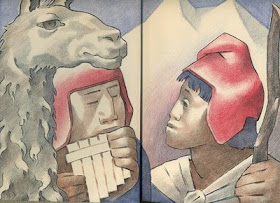
Secret of the Andes, by Ann Nolan Clark, is a short and rather heavy-handedly poetic story about a boy named Cusi, who lives in an isolated mountain valley, tending a flock of llamas with an older man. The story follows Cusi as he learns about life outside the valley and subsequently discovers why he lives there alone with Chuto.
So - a few things I liked about Secret of the Andes. It's relatively short, and I did like Clark's language sometimes, especially when she describes sunrise and spirituality in the mountains:
The morning was cold with the coldness of before dawn. It was gray with the grayness of before dawn. It felt unfriendly because the world had not yet wakened to make it happy with living things.Earth clouds! What a great description of fog.
Chuto was a dark shadow moving the gray shadows. Cusi followed him swiftly lest he become lost in the earth clouds that billowed around them (p. 19).
Then the sun came. Chuto's voice rose to meet the sun, and Cusi knew forever the joy of welcoming the coming of the Great Father who lightened and warmed the world.Furthermore, I have a fondness for descriptions of food in books (what can I say? I studied ethnobotany for several years), and I really enjoyed the parts about traditional Andean coca use, the frozen (actually freeze-dried) potatoes that Cusi grinds up, chicha (Clark missed a wonderful chance to describe how it's made with saliva), and the obscure grains - canihua (which is related to the better known quinoa) and "pigweed" (which may be amaranth [kawicha], or canihua or quinoa) - and of course the "guinea pigs and sweet potatoes" that Cusi eats a couple of times.
After the call was finished Chuto stood for a minute with head bowed, lost in thinking. For a brief time he had touched the Spirit World, and he hated to return to the realness of living. But it was only for a moment. With a sigh the old man raised his head, straightened his thin shoulders, and turned to the homeward trail (p. 36).
I didn't like the rather plodding plot of Secret of the Andes as much. I didn't care much about the heavily foreshadowed secret, and the emphasis on pure, royal Inca blood annoyed me - not to mention that these elements precluded any kind of normal family life for Cusi (one of the major sources of conflict in the story). The characters were all rather stoic and flat, and I didn't appreciate the pseudo-profound statements about following your heart, not grieving if your searching circles (no, I didn't mean you're, it's about searching in circles), and the like. I did rather enjoy Cusi's quasi-mystical relationship with the llamas, though I got a little tired of hearing how haughty and graceful they were.
In a lot of ways, Cusi's story reminded me of ...And Now, Miguel, which won the Newbery the following year (1954) - both are slow (if not ponderous), thoughtful stories about a boy's coming of age, with a lot of ethnographic detail. Is it possible that a lot of the same committee members were still there a year later?
When I went looking for the cover of the 1963 edition that I have checked out of my library, I couldn't find it online. So above you see a photo that I took (hopefully my local librarians won't hunt me down for putting the open book face down to get a shot of the wrap-around effect of the dust jacket).
Although I'm not a huge fan of illustrator Jean Charlot (and he illustrated ....And Now, Miguel, too! how interesting), I think his cover and the endpapers (seen here in a photo taken from Peter D. Sieruta's wonderful post on Secret of the Andes) fit the book very well. Much better than the modern adaptations. Why the heck do publishers keep slapping new cover illustrations on these classics?

Peter D. Sieruta's post also led me to an absorbing online discussion of The Secret of the Andes at the Heavy Medal blog, and how Secret compares to the Newbery Honors books of 1953 - especially Charlotte's Web, by E.B. White. I don't think anyone can deny that Charlotte's Web is the more widely read and loved book today. But is Secret of the Andes actually a better book? Be sure and read the comments, they're quite enlightening.
Secret of the Andes - Part I (should Charlotte's Web have won?)
Part II (or why some people do like Secret of the Andes)
Part III (why some people think Secret won)
Part II (or why some people do like Secret of the Andes)
Part III (why some people think Secret won)


No comments:
Post a Comment